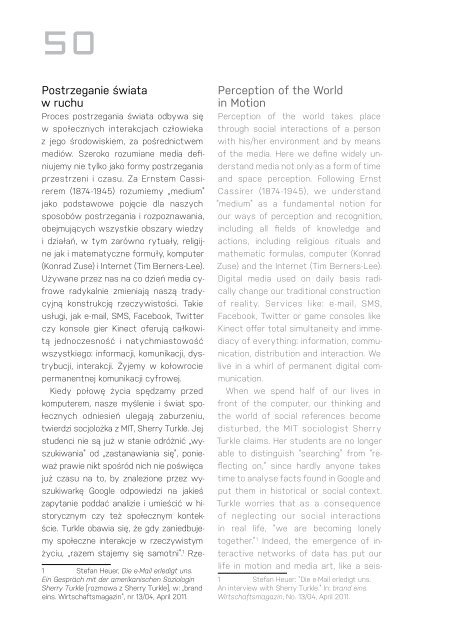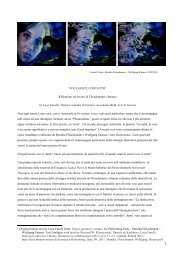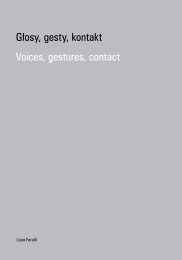Performing Data | Monika Fleischmann + Wolfgang Strauss
Performing Data is a review of Monika Fleischmann´s and Wolfgang Strauss´artistic body of work and a catalogue of their exhibition in Poland 2011. It presents works from Virtual Reality (Home of the Brain) up to Mixed Reality (Murmuring Fields) from Fluid Interface (Liquid Views) up to Floating Interface (Medienfluss) and texts by Ryszard W. Kluszczynski, Derrick de Kerkhove, Luca Farulli. Monika Fleischmann and Wolfgang Strauss from the German Fraunhofer research institute show us an intersection of the body and immaterial digital data. Immersion in data flow causes productive moments of disturbance and suspension, and consequently – a feeling of real physical presence. Fleischmann, Monika; Strauss, Wolfgang: Performing Data | Performowanie danych. National Centre for Culture, Warszawa 2011 in collaboration with Laznia CCArt, Gdańsk, Poland 2011 ISBN 978-83-61587-55-2 (en/pl) http://artline-southbaltic.eu/de/event/performing-data/
Performing Data is a review of Monika Fleischmann´s and Wolfgang Strauss´artistic body of work and a catalogue of their exhibition in Poland 2011. It presents works from Virtual Reality (Home of the Brain) up to Mixed Reality (Murmuring Fields) from Fluid Interface (Liquid Views) up to Floating Interface (Medienfluss) and texts by Ryszard W. Kluszczynski, Derrick de Kerkhove, Luca Farulli.
Monika Fleischmann and Wolfgang Strauss from the German Fraunhofer research institute show us an intersection of the body and immaterial digital data. Immersion in data flow causes productive moments of disturbance and suspension, and consequently – a feeling of real physical presence.
Fleischmann, Monika; Strauss, Wolfgang: Performing Data | Performowanie danych. National Centre for Culture, Warszawa 2011 in collaboration with Laznia CCArt, Gdańsk, Poland 2011 ISBN 978-83-61587-55-2 (en/pl) http://artline-southbaltic.eu/de/event/performing-data/
You also want an ePaper? Increase the reach of your titles
YUMPU automatically turns print PDFs into web optimized ePapers that Google loves.
Postrzeganie świata<br />
w ruchu<br />
Proces postrzegania świata odbywa się<br />
w społecznych interakcjach człowieka<br />
z jego środowiskiem, za pośrednictwem<br />
mediów. Szeroko rozumiane media definiujemy<br />
nie tylko jako formy postrzegania<br />
przestrzeni i czasu. Za Ernstem Cassirerem<br />
(1874-1945) rozumiemy „medium”<br />
jako podstawowe pojęcie dla naszych<br />
sposobów postrzegania i rozpoznawania,<br />
obejmujących wszystkie obszary wiedzy<br />
i działań, w tym zarówno rytuały, religijne<br />
jak i matematyczne formuły, komputer<br />
(Konrad Zuse) i Internet (Tim Berners-Lee).<br />
Używane przez nas na co dzień media cyfrowe<br />
radykalnie zmieniają naszą tradycyjną<br />
konstrukcję rzeczywistości. Takie<br />
usługi, jak e-mail, SMS, Facebook, Twitter<br />
czy konsole gier Kinect oferują całkowitą<br />
jednoczesność i natychmiastowość<br />
wszystkiego: informacji, komunikacji, dystrybucji,<br />
interakcji. Żyjemy w kołowrocie<br />
permanentnej komunikacji cyfrowej.<br />
Kiedy połowę życia spędzamy przed<br />
komputerem, nasze myślenie i świat społecznych<br />
odniesień ulegają zaburzeniu,<br />
twierdzi socjolożka z MIT, Sherry Turkle. Jej<br />
studenci nie są już w stanie odróżnić „wyszukiwania”<br />
od „zastanawiania się”, ponieważ<br />
prawie nikt spośród nich nie poświęca<br />
już czasu na to, by znalezione przez wyszukiwarkę<br />
Google odpowiedzi na jakieś<br />
zapytanie poddać analizie i umieścić w historycznym<br />
czy też społecznym kontekście.<br />
Turkle obawia się, że gdy zaniedbujemy<br />
społeczne interakcje w rzeczywistym<br />
życiu, „razem stajemy się samotni”. 1 Rze-<br />
1 Stefan Heuer, Die e-Mail erledigt uns.<br />
Ein Gespräch mit der amerikanischen Soziologin<br />
Sherry Turkle [rozmowa z Sherry Turkle], w: „brand<br />
eins. Wirtschaftsmagazin”, nr 13/04, April 2011.<br />
Perception of the World<br />
in Motion<br />
Perception of the world takes place<br />
through social interactions of a person<br />
with his/her environment and by means<br />
of the media. Here we define widely understand<br />
media not only as a form of time<br />
and space perception. Following Ernst<br />
Cassirer (1874-1945), we understand<br />
“medium” as a fundamental notion for<br />
our ways of perception and recognition,<br />
including all fields of knowledge and<br />
actions, including religious rituals and<br />
mathematic formulas, computer (Konrad<br />
Zuse) and the Internet (Tim Berners-Lee).<br />
Digital media used on daily basis radically<br />
change our traditional construction<br />
of reality. Services like: e-mail, SMS,<br />
Facebook, Twitter or game consoles like<br />
Kinect offer total simultaneity and immediacy<br />
of everything: information, communication,<br />
distribution and interaction. We<br />
live in a whirl of permanent digital communication.<br />
When we spend half of our lives in<br />
front of the computer, our thinking and<br />
the world of social references become<br />
disturbed, the MIT sociologist Sherry<br />
Turkle claims. Her students are no longer<br />
able to distinguish “searching” from “reflecting<br />
on,” since hardly anyone takes<br />
time to analyse facts found in Google and<br />
put them in historical or social context.<br />
Turkle worries that as a consequence<br />
of neglecting our social interactions<br />
in real life, “we are becoming lonely<br />
together.” 1 Indeed, the emergence of interactive<br />
networks of data has put our<br />
life in motion and media art, like a seis-<br />
1 Stefan Heuer: “Die e-Mail erledigt uns.<br />
An interview with Sherry Turkle.” In: brand eins.<br />
Wirtschaftsmagazin, No. 13/04, April 2011.







